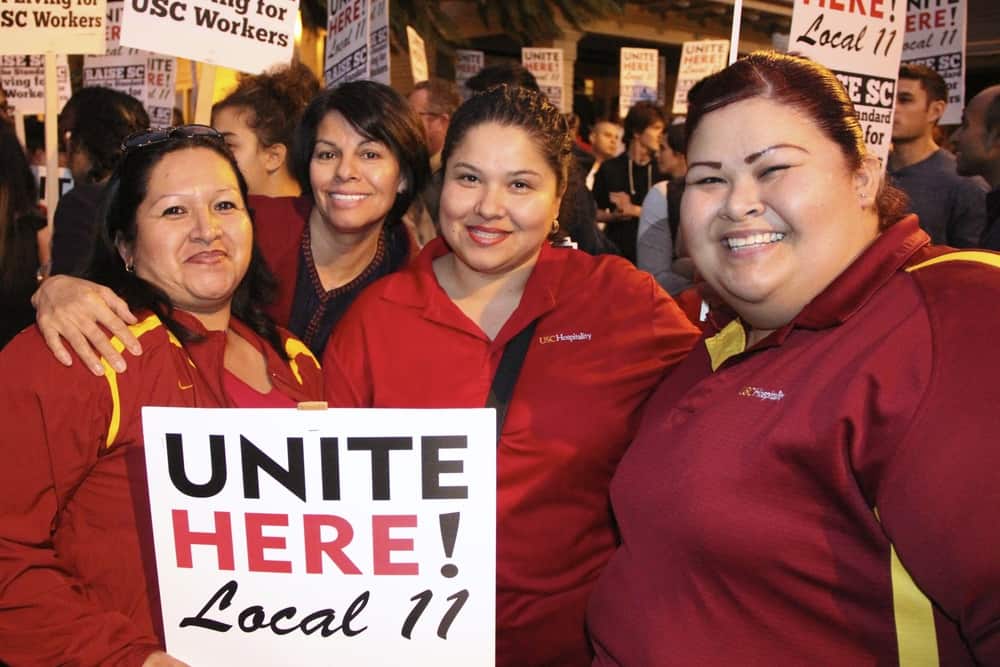Haga clic aquí para español.
Take a quick glance at the website for the UNITE HERE! labor union and you’ll see a number of issues focused on women – #MeToo, workplace discrimination, and fighting sexual harassment. You’ll find materials on protecting families and communities. This is not your grandpa’s union. UNITE HERE! is part of a generation of unions supporting women and their communities.
According to their website, UNITE HERE! “represents 270,000 working people across Canada and the United States. Our members work in the hotel, gaming, food service, manufacturing, textile, distribution, laundry, transportation, and airport industries.” Women of color make up the predominant part of the membership.
Women have historically proved vital to the success and work of unions, but have not received the same appreciation nor protections. On this Feast of St. Joseph the Worker, I want to highlight the historic and present-day roles of women in the labor movement.
Women of the Labor Movement
Labor history unfortunately places a hyper-emphasis on men, which ignores the invaluable contribution of women. The labor movement as it stands today would not exist without the blood, sweat, and tears of women. Just a quick glance through this timeline demonstrates that the labor movement would not have survived without women.
Three particular individuals stand out to me: Mother Jones, Dolores Huerta, and Hattie Canty.
Mary Harris Jones had several nicknames, including “Mother Jones,” “the grandmother of all agitators,” and “the most dangerous woman in America.” She worked as a union organizer for the Knights of Labor and United Mine Workers. In addition to contracts and good pay, Jones fought for racial justice and protection of families. Her lifetime of work ensured the enduring power of labor.
Dolores Huerta became one of the most important leaders in the fight for agricultural workers. Huerta began her efforts with voter registration and creating change in local governments. Huerta successfully lobbied for disability insurance for farm laborers in California, as well as the right for farm workers to collectively organize.
Hattie Canty led a strike lasting over over six years, earning her the title “one of the greatest strike leaders in US history.” Canty believed that one could not separate the labor movement from the civil rights movement, and thus constantly fought for communities of color. Canty joined Culinary Workers Union 226, affiliate of the Hotel Employees and Restaurant Employees International Union (HERE). Through her work, Canty won higher wages, better conditions, and higher representation of women and people of color.
Today’s Female Frontlines
In 2004, Canty’s HERE merged with UNITE (Union of Needletrades, Industrial, and Textile Employees) to form UNITE HERE! The regional chapter Local 8 in Seattle has been responsible for massive victories to protect women.
I recently had a chance to conference call with Nuris Deras and Rose Mary Alegria – members of the Local 8 – to talk about the impact of the union on their lives. Nuris and Rose Mary spoke at length about the pride in their work, the protection that being in a union provides, their faith, and their hope for the future.1
Both Nuris and Rose Mary take great pride in their work. That work, however, has led to several challenges and dangers. Seattle recently passed the I-124 Legislation, which limits the number of square feet a cleaner can work in a given day, as well as create protections against sexual harassment. Both women praised the legislation for the positive impact it has on their safety and well-being.
Just a few days before I-124 passed, a male guest sexually harassed Nuris while she worked in a room. She described how uncomfortable and fearful the event left her. Now, the new legislation gives workers the right to a panic button. The union is advocating for the buttons to not only make a loud noise, but also immediately connect to the front desk. In addition to the buttons, guests who harass the staff will be added to a list banning them from future stays. Perhaps most importantly, the law protects workers who report violations.
In addition to protections from harassment, the legislation saves workers from unreachable expectations. A generally clean room will take staff about a half an hour to turn over. Filthy rooms, however, can take upwards of an hour. No matter the state of the room, hotel management typically requires the staff to finish in a half hour. Non-union hotels force workers to complete 16 to 18 rooms in a day.
Nuris stated that the unions protected them: they clean 14 rooms per day, and can ask management to view a room to receive additional time. When hotels do not follow these rules, Rose Mary feels confident that the union provides her with the tools to hold them accountable. Local 8 helped Rose Mary find her voice for justice and her rights. In turn, Rose Mary hopes to continue inspiring her coworkers and staff at other hotels to fight for their rights.
Perhaps one of the greatest successes of Local 8 has been providing members with health insurance. Both Nuris and Rose Mary emphasize how vital insurance has been for them and for their families’ well-being. When Nuris lived in Ohio, she had a $4,000 hospital visit. Without insurance at the time, she struggled to pay back the debt. With insurance in her present job, she feels she can better care for herself and her family. Rose Mary noted that staff at neighboring hotels often speak longingly of having similar insurance.
Rose Mary spoke proudly of her fight for justice. She stated that her work was for her children and grandchildren – she hopes they never suffer abuse or injustice. “What I’m building now will be for my next generation: my kids, my grandkids. I don’t want my kids to suffer abuse or injustices. I want them to also learn about their rights. I am very motivated by all the things I have learned. I want them to defend their rights wherever they go. That’s the kind of inheritance that I want to pass on to my children.”
Faith has played a major role in their work. Nuris stated that faith moves and motivates the workers, opening their hearts to the stories and plights of others. Listening to the stories of others helped them realize each individual was not fighting for only their benefit, but for all those less-fortunate. Likewise, Rose Mary found inspiration in her faith. Her favorite Scripture passage is “Everything is possible for those who believe” (Mark 9:23). When she really began believing this passage, she realized that justice comes from God. When asked about motivation, Rose Mary boldly proclaimed, “That is what most motivates me – faith!” Her faith, she proudly stated, demands action and care for the marginalized.
The Female Future of American Unions
Despite legislative attacks on organized labor across the country, union membership in the U.S. recently jumped by over 10,000. The future of American labor unions will continue to be led and shaped by female leaders. Unions have been making huge waves in the news recently as teacher strikes with female majorities have been sweeping across the country.
Meanwhile, UNITE HERE! continues protecting housekeepers and fighting sexual harassment. It is a union predominantly of women. They have been the backbone of the American labor movement, and will continue to lead as we move forward. The women of the labor movement continue to guarantee higher wages, fight for insurance, and protect workers from sexual harassment. They are demanding and achieving greater equality.
This Feast of St. Joseph the Worker, let us pay special honor to the women who have, continue to, and will always fight for justice.
***
Image courtesy of UNITE HERE!.
- The conversations were conducted on a conference call through a translator, which did not permit the capture of many direct quotes. ↩


